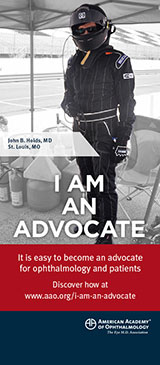 I became a member of my state ophthalmology society, the Missouri Society of Eye Physicians and Surgeons, shortly after I moved to Missouri in 1990. At first it seemed like a good way to meet other ophthalmologists at regional meetings. I became interested in the issues that are regulated at a state level, such as licensure and scope of practice. Knowing that all politics is local, I got involved with state legislative issues through MOSEPS and our state medical society.
I became a member of my state ophthalmology society, the Missouri Society of Eye Physicians and Surgeons, shortly after I moved to Missouri in 1990. At first it seemed like a good way to meet other ophthalmologists at regional meetings. I became interested in the issues that are regulated at a state level, such as licensure and scope of practice. Knowing that all politics is local, I got involved with state legislative issues through MOSEPS and our state medical society.
Watching what has gone on in Missouri over the past 24 years has been interesting and informative. In the past several years, John Hagan, MD, in Kansas City, and myself in St. Louis, have somewhat anchored the west and east “coasts” of Missouri for legislative affairs. There have been a number of years in which little happened. Other years have offered fascinating legislative fireworks. The state society, the Academy’s Surgical Scope Fund (on which I now serve) and the Academy’s Secretariat for State Affairs, headed up by Dan Briceland, MD, have all been absolutely key in promoting good legislative policy in Missouri.
The lessons I have learned over those years are important to all ophthalmologists. A strong state ophthalmology society with broad membership, an involved executive director, and active key members is essential to represent ophthalmologists in front of the legislature. An active state medical society that can work closely with the ophthalmology society is also important to provide the weight of numbers from the “house of medicine” in dealing with the state legislature.
In addition, ongoing relationships with lobbyists who are active, respected and understand your issues are essential. In Missouri we have had the same relationships for some 20 years, which has served us well in times of need. This is a yearly expense that may increase when the embers start burning, but is mandatory to monitor legislative activity and plan how to deal with upcoming issues.
Ophthalmologists must become involved in the political process by developing close relationships with their state legislators and at least a couple of very close relationships with key legislators. Ultimately this means spending some of your time and money developing these relationships, traveling to the state capitol a few times a year (sometimes on short notice to testify in a committee hearing), and making campaign contributions. Ophthalmology is most effective when we rope in our colleagues and have an ophthalmology-sponsored fundraiser for legislators. In Missouri we had a several-year period in which multiple optometrists served in the state legislature, including three years during which one of them was a powerful House speaker. During that time, MOSEPS was able to keep a scope-of-practice bill from appearing in the legislature and even dispose of an existing school vision exam requirement that was inconsistent with standard medical advice.
A strong state ophthalmology society, involved membership, active lobbyists, ongoing legislative contacts and the support of the Academy’s Surgical Scope Fund and State Affairs are all essential to represent ophthalmology at a state level.
John B. Holds, MD, is an ophthalmic plastic surgeon with Ophthalmic Plastic and Cosmetic Surgery, Inc., and a clinical professor of ophthalmology and otolaryngology-head and neck surgery at Saint Louis University. He is also an endurance race car driver.